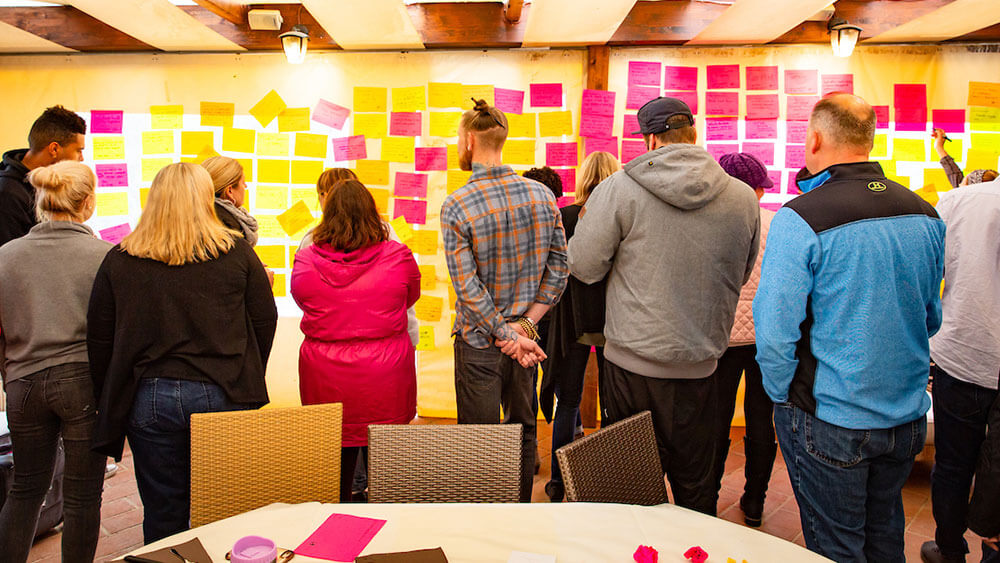
Secret Family Reunion look over the crowdsourcing board where they posted their ideas for session topics to be presented at the event. (Photos courtesy of Haute Dokimazo)
The invitation for the first Secret Family Reunion, Nov. 2–6, 2019, an event dreamed up by Haute Dokimazo — an Austin, Texas–based event company dedicated to improving meeting, sharing, and learning by using an unconference, spontaneous think-tank format — might have very well included the proviso “control freaks need not apply.”
Participants wouldn’t know where they were headed until just prior to boarding the flight. Nor could they review a conference program to determine if the four-day professional development event covered topics relevant to them, because the sessions would be crowdsourced on site. They would just pay their way — between $2,500 and $3,500, depending on their choice of accommodations — and trust they’d have a meaningful experience. And 80 people did just that.
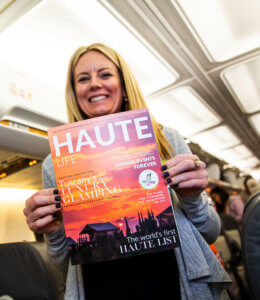
The Haute Life magazine, handed out during the flight to Italy, offered attendees a look at their fellow participants as well as their final destination, Agriturismo Diacceroni, a farming estate in the Tuscan countryside.
Before arriving at a pre-flight destination reveal party at JFK Airport’s TWA Hotel in New York on Nov. 2, the participants knew only to show up with bags packed, based on a checklist of items they had been instructed to bring, have their passports in hand, and be prepared to shut off their phones to fully engage with fellow passengers during the all-inclusive trip.
Once the location was revealed — Agriturismo Diacceroni, a farming estate in the Tuscan countryside — participants climbed aboard the chartered 737 Oryx Jet to find a customized inflight magazine with bios of all those on board. They got to know each other in a more personal way via an inflight conga line and glow-in-the-dark dance party. A third of the flight was devoted to sleep.
The event was the first of its kind, according to Nicole Osibodu and Liz Lathan, who along with Tom Spano founded Haute Dokimazo in 2015, after experiencing what they called “xylophone shaming” at a conference. The three friends were having an “amazing” conversation in a hallway, when “ding, ding, ding, we were ushered back into a session,” Osibodu said. “We were like, ‘No, our conversation’s really great right now.’”
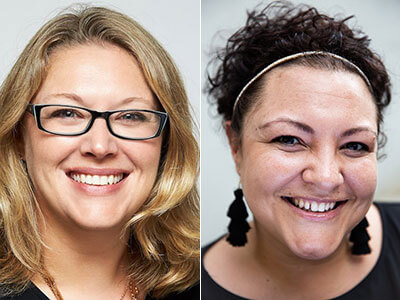
Liz Lathan (left) and Nicole Osibodu dreamed up the Secret Family Reunion after hearing feedback from another Haute Dokimazo event.
They realized that conversations outside sessions — real talk between attendees rather than a passive speaker-listener scenario — had great value and should be encouraged. The problem with conferences, they agreed, is that there aren’t enough opportunities for that kind of informal but effective collaboration. They wanted to build a company that would focus on making events more friendly, more personal, and more of a peer-to-peer experience. “We want to make humans feel connected to each other,” Osibodu said.
Before they could do any of that, they had to come up with a name for their company that would capture its purpose. One of them found the Greek word “dokimazo,” which means to examine whether a thing is — or to recognize it as — genuine. Upon learning the meaning, Osibodu reacted in a genuine way, Lathan said, by exclaiming, “‘That’s hot!’ That’s what we want people to bring to events — their genuine selves, their spontaneous selves.”
In order to get their attendees to open up, Haute Dokimazo begins all of its events with a “welcome attack,” greeting attendees with a handshake or a hug instead of an impersonal registration desk. Following that friendly first impression, events get everyone together for a family-style meal, where people are introduced to their table mates. Through the process of sharing food around the table, real conversations can begin immediately, Lathan said.
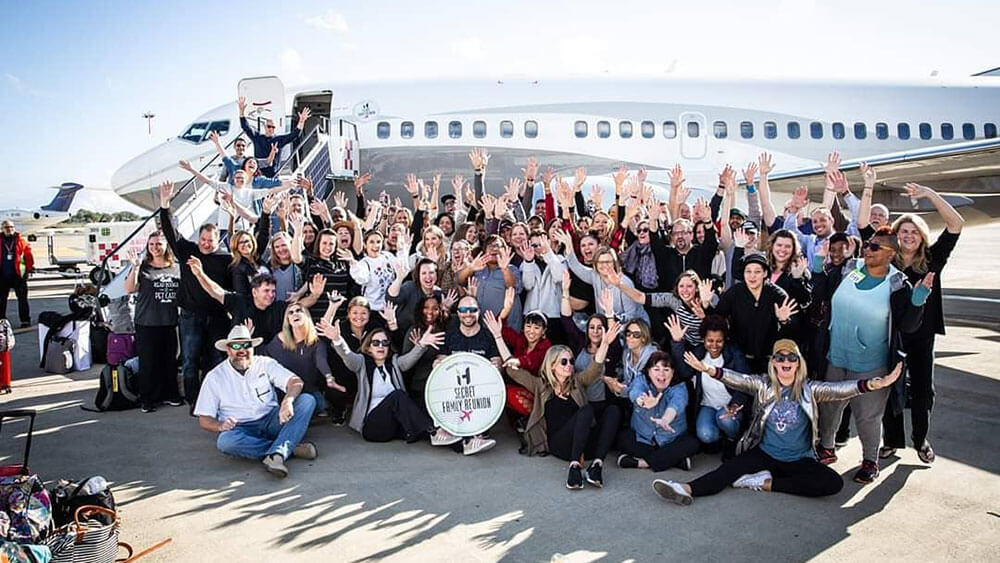
All the Secret Family Reunion participants knew in advance about their host destination was that it required bringing their passport. The destination was revealed just a few hours before they caught their flight.
One Big, Italian Family
The concept for the Secret Family Reunion grew out of this guiding principle of turning participants into family, Lathan said. So why not, the cofounders thought, bring previous participants — event planners and suppliers — back together for a reunion? Lathan and Osibodu decided to keep the reunion itinerary a secret until the last minute simply because “it was fun,” they said. Also, Osibodu said, she had always wanted to plan a secret trip.
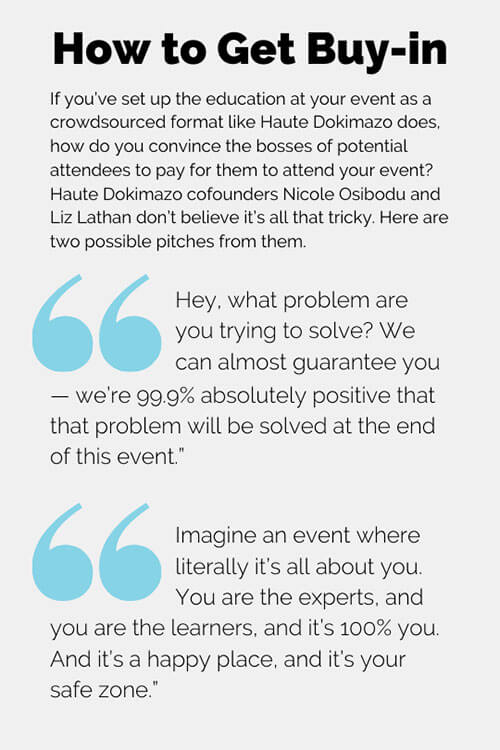 So they began inviting their “event industry family,” but soon were getting requests to join from people outside the events industry who had never been to one of their events, Lathan said, including marketing professionals, authors, executive coaches, entrepreneurs, CEOs, and even an artist. The primary thing they all had in common, Lathan said, “is that they work in or around human-to-human experiences.”
So they began inviting their “event industry family,” but soon were getting requests to join from people outside the events industry who had never been to one of their events, Lathan said, including marketing professionals, authors, executive coaches, entrepreneurs, CEOs, and even an artist. The primary thing they all had in common, Lathan said, “is that they work in or around human-to-human experiences.”
“I thought it was going to be a bunch of event managers,” said Osibodu, who serves as Haute Dokimazo’s president. “I never thought in a million years that a CEO of a very large or small company would take five days for an event with spotty Wi-Fi that had no agenda, where they knew nobody or where they were going.” Yet, 30 CEOs signed up.
Once the plane landed, the adventurers set off for a tour of the city of Pisa before finally sharing that family-style dinner. But by then, the jet-lagged bunch of former strangers already were feeling like friends, said participant Debbie Koslowski, an event marketing manager at Emerson, a tech company in Boulder, Colorado.
The reveal party, flight activities, and Pisa tour built a foundation for the success of the entire event, Koslowski said. “You learn that people are just people and you can depend on them. Titles or previous experience don’t matter. No one had an ego. It was more, ‘We’re all in this adventure together and let’s just take every experience as it comes,’” she said.
On its website, Haute Dokimazo says fostering camaraderie among attendees allows them to “have the courage to speak more openly, contribute more freely, and take greater risks.” Mission accomplished for Koslowski. “Having that openness just very much helped with someone like me who is maybe a little bit more quiet sometimes,” she said, adding that she felt comfortable enough to speak up and offer advice from her own experiences.
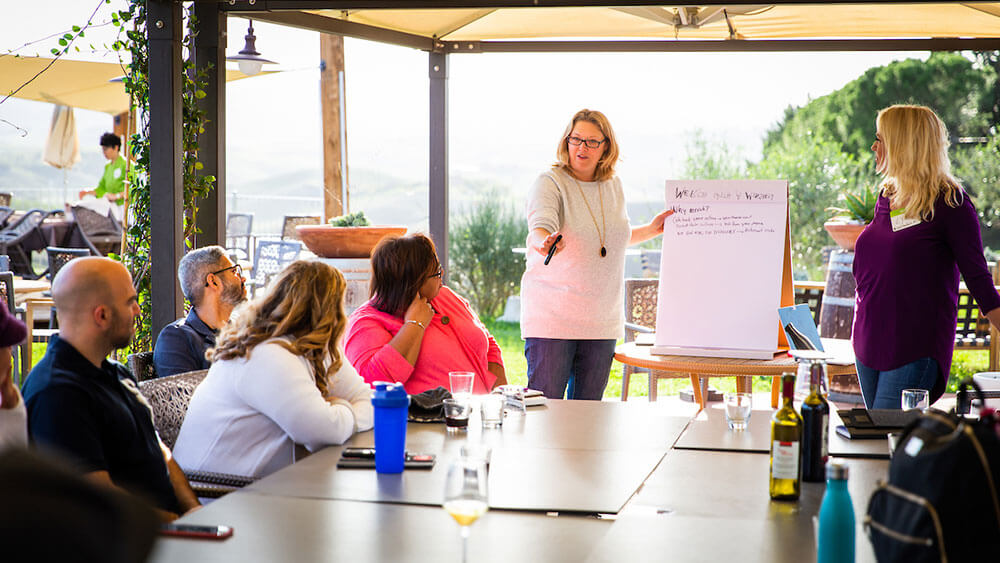
Each crowdsourced session was facilitated by a participant who had experience or expertise in the specific topic.
‘That Aha Moment’
Haute Dokimazo’s approach to its think-tank sessions is based on crowdsourcing — asking attendees to write down their real-life questions and challenges on Post-It notes and stick them on a wall. Secret Family Reunion participants were asked to think of those in advance of attending the event and then they posted them on the wall on site. Once that was done, Osibodu and Lathan sent participants off to enjoy truffle-hunting, pasta- or bread-making classes, or other activities taking place at the farm resort, while they sorted through the topics. They then asked attendees with topic expertise to act as facilitators instead of having speakers lead the sessions.
Some of the ideas that became sessions included “Got fear? Don’t let perfect be the enemy of good,” “Sponsorship: Finding them, activating better,” “Taking client relationships from Tinder to marriage,” “Speaker! Sourcing/managing and cultural appropriation and making the content not boring (diversity!),” and “Company culture: Accountability, innovation, growth, celebrating wins.” Sessions ran for one hour each, except for the SwagHub Strategy Sessions, which took up two hours.
Koslowski said the think-tank sessions were some of the most useful she has ever attended. “The first session I went to, I had that aha moment,” she said. “I thought to myself, ‘If I don’t do or learn anything else from this event, this one session in the first 10 minutes made it all worth it.’” Covering marketing metrics, KPIs, and ROI, the session was more of a “frank conversation” than a presentation, Koslowski said, and helped her rethink how to help her sales team understand the importance of the lead-generation process and tracking leads in the customer relationship management system.
Participants took part in about four hours of peer-to-peer, concurrent sessions each day, interspersed with activities created by members of the family that operates Diacceroni, and some sightseeing and nightly dinners. “I would say it was 100 percent a professional conference, and the amount of content hours actually was more than most conferences give,” Lathan said.
Attendees, however, went well beyond the 25 sessions that came out of crowd-sourcing. Smaller groups got together informally at dinner or at other times to work on issues, Lathan said. Koslowski, for example, had a lunch conversation with a fellow participant after receiving an invitation written on the Post-It note that had her think-tank topic on it to seek out that person as a resource. Koslowski was struggling with the challenge of her company “going through significant restructuring resulting in many of my events being cut,” she said. She was seeking ideas to help support the entire events team at her company and to enhance her own career objectives.
Koslowski and the other participants worked through how she could write a modified job description that would address how she can be of service within the framework of the restructuring and put together a communication strategy for pitching her ideas to management, she said.
“I came back with just about every solution to my problem, so I was able to basically work through it when I got home,” she said. And although things haven’t happened exactly how she’d hoped, there is positive movement, she said, and she continues to have conversations with her Secret Family Reunion colleague.
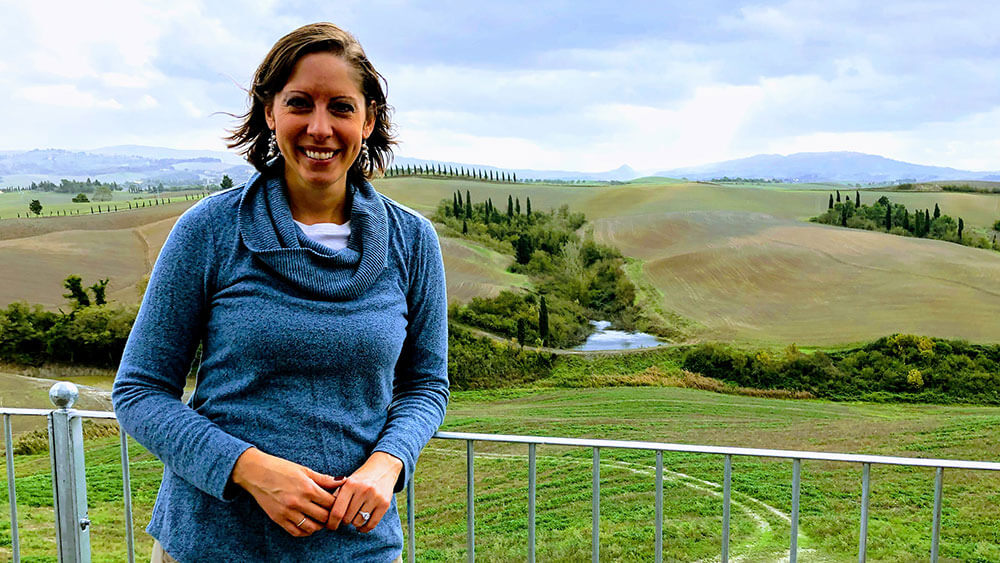
Secret Family Reunion participant Debbie KoslowskI takes in the Tuscan countryside. Even after the Secret Family Reunion, Koslowski keeps in touch with some of the people she met during the event.
‘We Couldn’t Stop Them’
The collaborations continued on the flight home, too. “We couldn’t stop them,” Osibodu said, adding that participants still are working together to solve each other’s problems. “We still can’t stop them,” she said, laughing.
Haute Dokimazo started a Whatsapp chat room during the trip that participants, including Koslowski, still actively use. “It sounds so cliché,” she said, but the trip “was completely life-changing. A decent amount of the people that I met I now call my friends who I can rely on to give honest feedback any time.”
Feedback is the final key to Haute Dokimazo events, the cofounders said. They end every event with a “live retrospective” in which participants freely offer their thoughts on the event and ideas for future events. In fact, the Secret Family Reunion grew out of one such retrospective portion of a past event when someone suggested an informal get-together.
The Secret Family Reunion’s retrospective will lead the team to shake things up for the next one — which won’t happen until 2021, they say. Even though it may seem like a freewheeling event to participants, it takes about 18 months to plan and pull off.
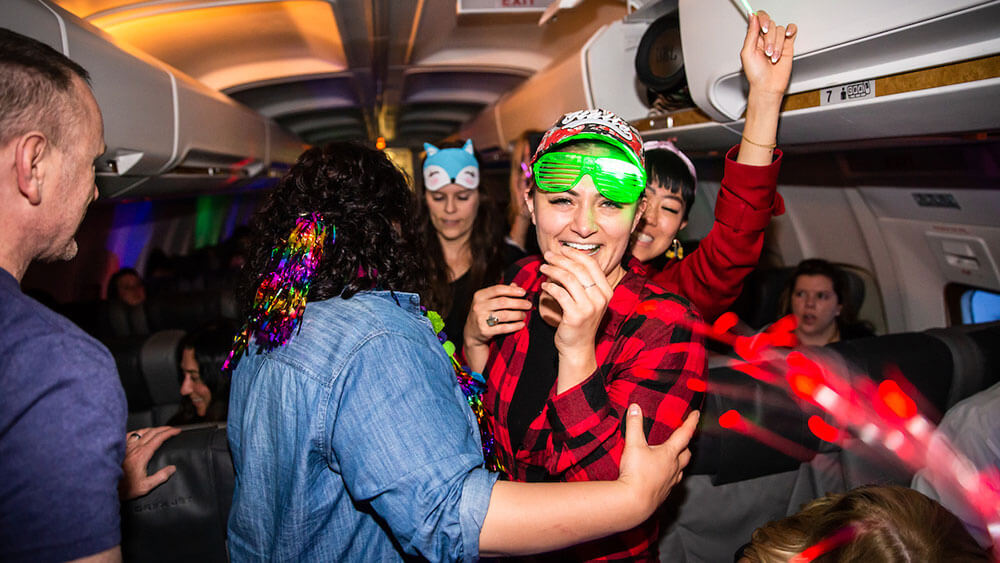
Only one-third of the time aboard the Secret Family Reunion flight was reserved for sleep. The rest was all about fun and spontaneity.
Steal This Idea
While you might not be able to find a sponsor to pay for you to whisk all your attendees away in a chartered airplane to Italy, there are some aspects of the Secret Family Reunion any planner could incorporate into their events, say Haute Dokimazo cofounders Nicole Osibodu and Liz Lathan, who — along with participant Debbie Koslowski — offer these ideas:
Create a safe space. When participants feel safe, they feel more free to dig into problems and raise questions, Lathan said. “You must hug,” she said. “Hugging, eating together, being genuine, listening to people, sharing, learning, being there for each other. Is that world peace?
I don’t know what’s better than that.”
Crowdsource at least part of your schedule. While much of the Secret Family Reunion impressed Koslowski, an event marketing manager at Emerson, she singled out the idea of crowdsourcing discussion topics as something that easily could be added to any event. It’s “people looking to their experiences and their qualities and what they can bring to the table,” she said.
Embrace spontaneity. Injecting fun and spontaneity into an event is as important as the education, Osibodu said. “It’s not about how much it costs, or where we went — or any of those things. We believe that memorable moments cement learnings,” she said. “It’s about the fun and the sheer joy that you inject in every moment. If you’re not genuinely enjoying putting this together for your participants, then they’re going to feel that.”
Curt Wagner is an associate editor at Convene.
